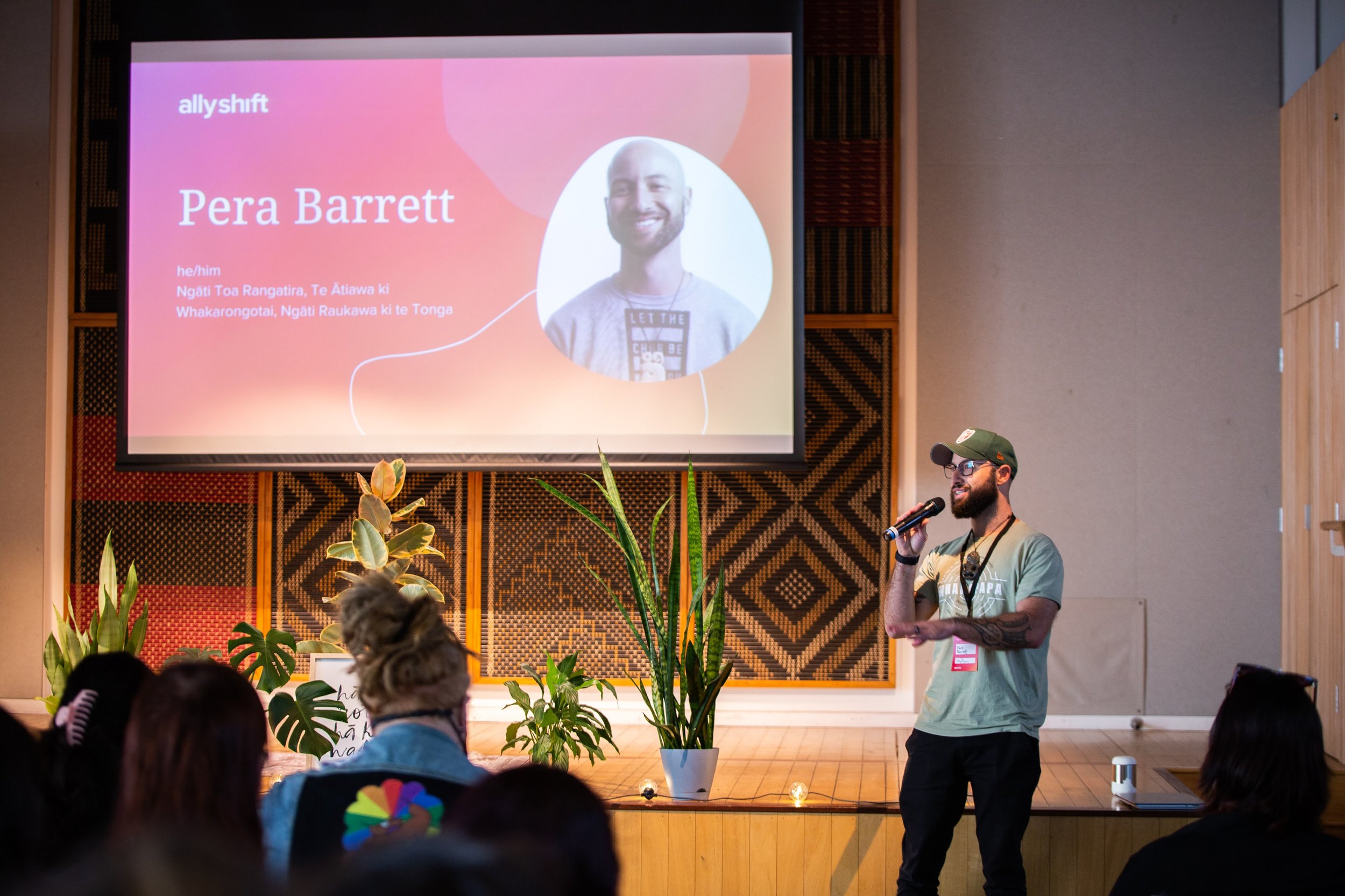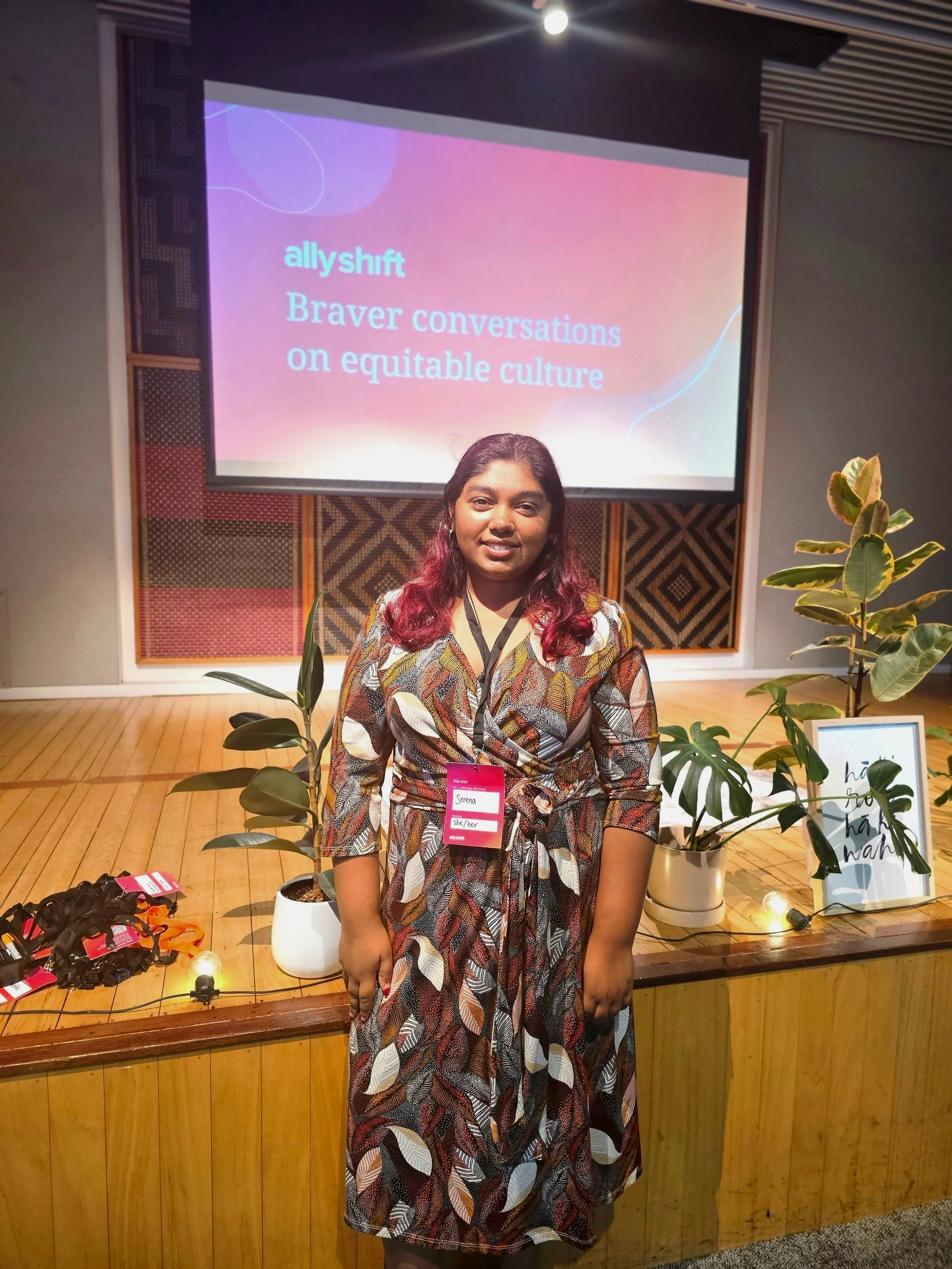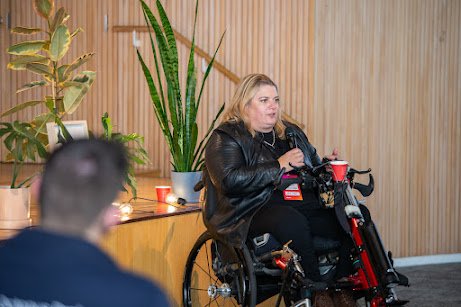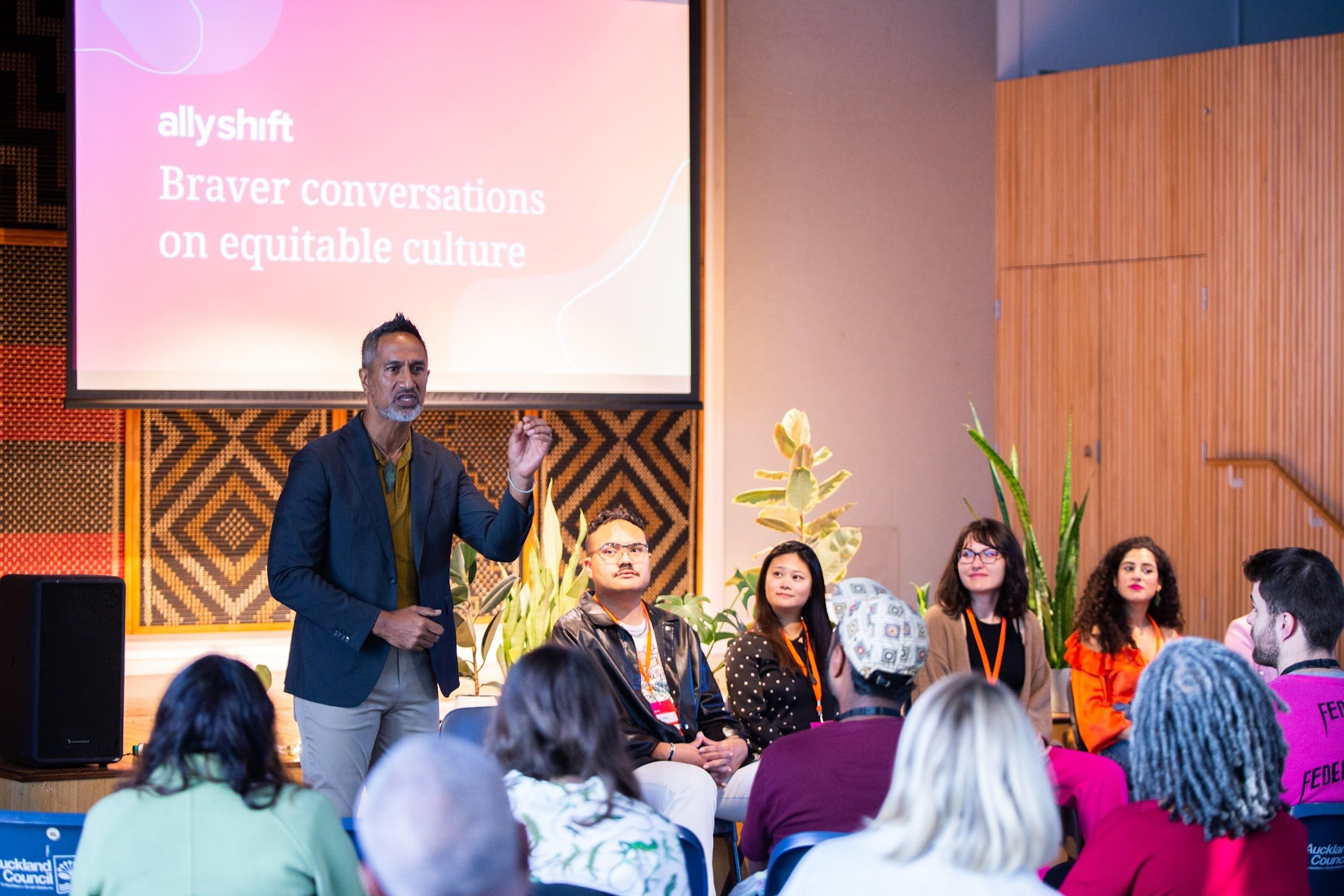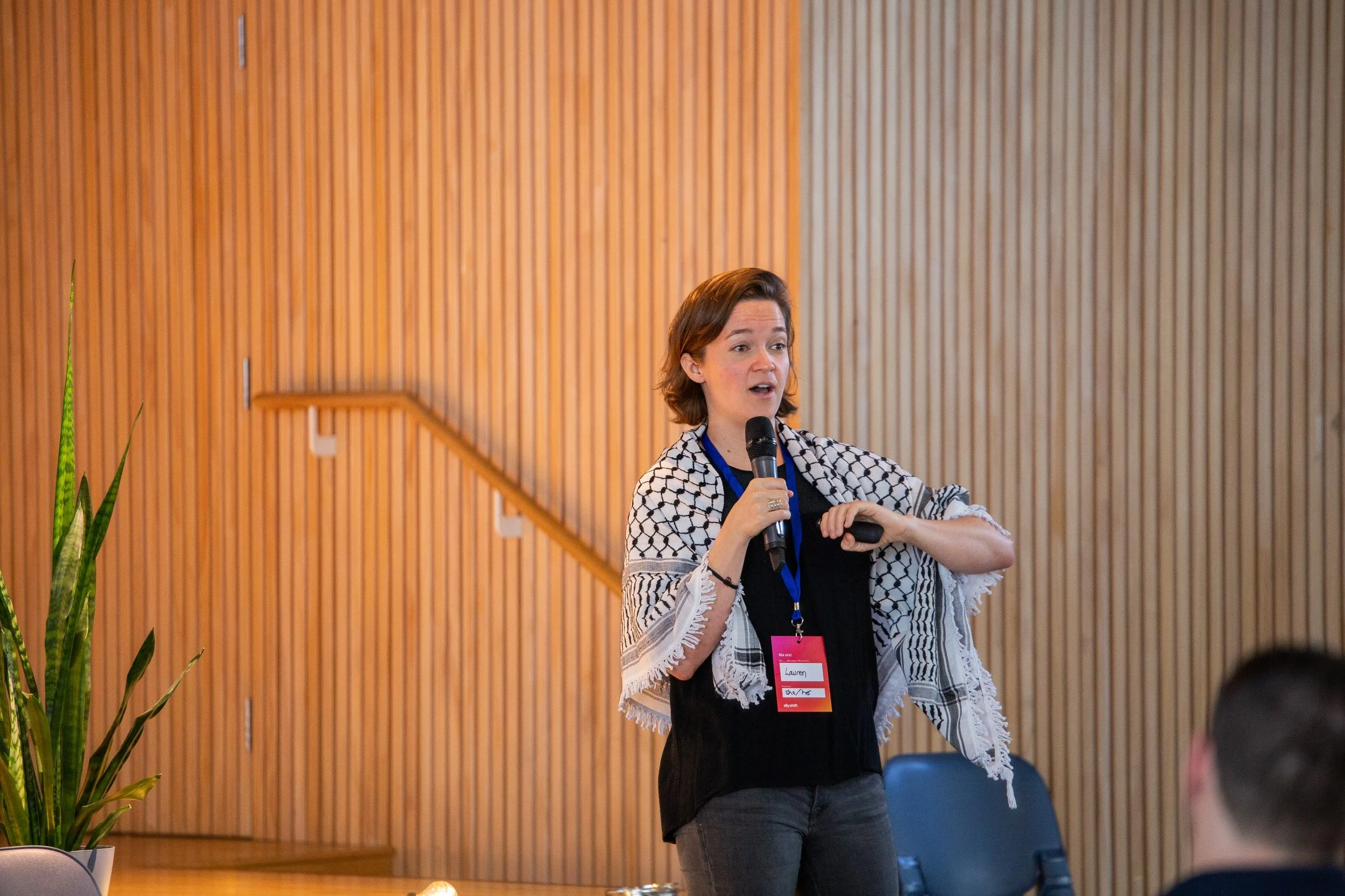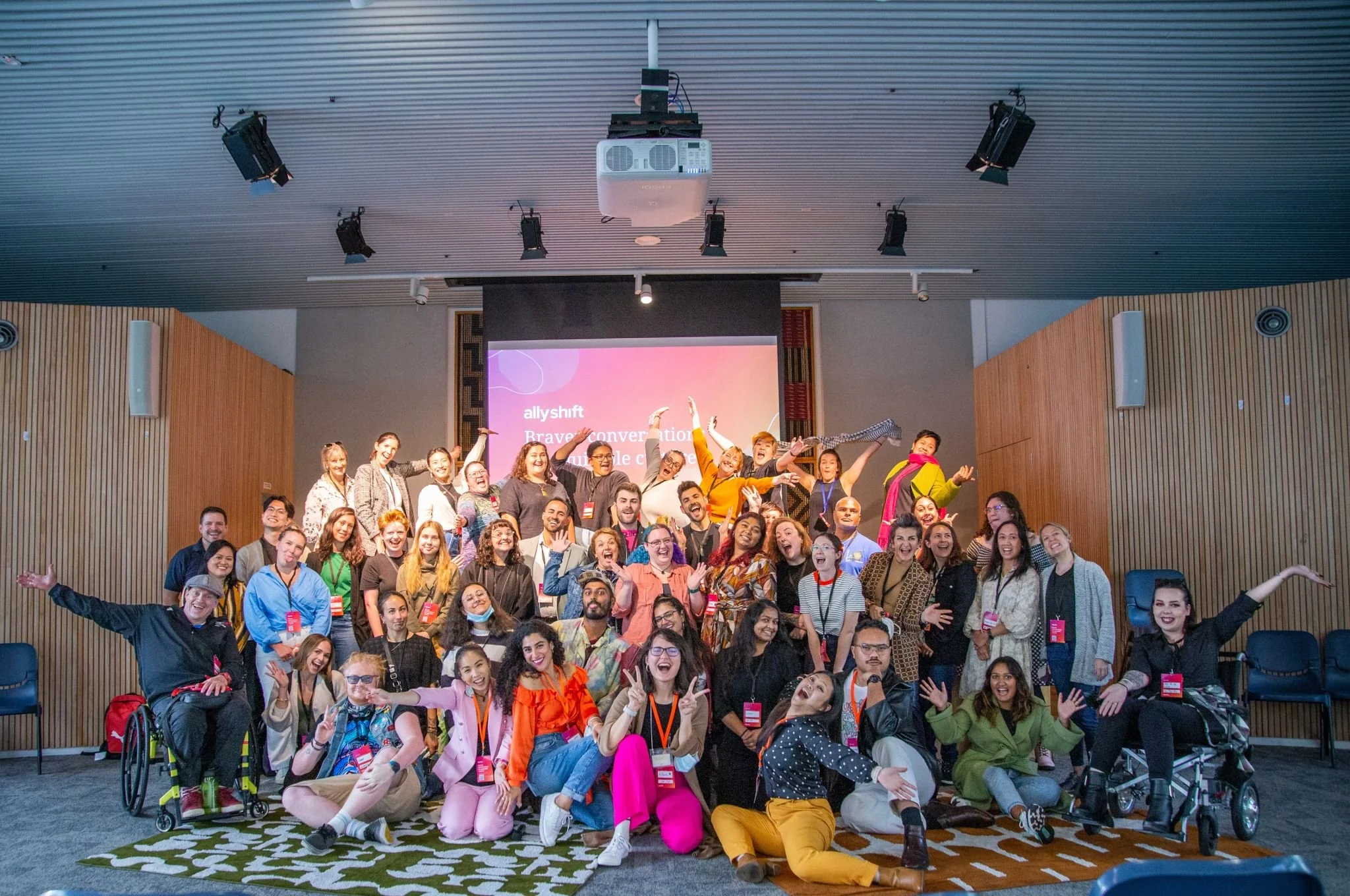Allyshift: Mobilising Equity & Inclusion in Aotearoa
Allyshift emerged as a beacon of hope and connection, providing a much-needed space for dialogue and renewal amidst the ongoing challenges in the realm of equity and inclusion.
Seeking ideas and action from a hopeful and connected place, even when everything feels heavy, and progress seems slow.
This event, created by dedicated organisers and attended by passionate individuals, served as a testament to our collective commitment to fostering positive change in our communities. With heartfelt gratitude, we extend our appreciation to all who contributed to making Allyshift a warm and nurturing experience.
Organising Team
This kaupapa is co-organised by Ally Skills NZ facilitators, Elina Ashimbayeva, Erica Austin, and Vivian Chandra, together with Laura Kerrison, Paula Neme and Kauri Tearaura.
Photo Credit: Erica Austin, Peanut Productions Photography
At Allyshift, Pera Barrett delivered a powerful message on the importance of aligning our actions with our kaupapa, our core principles and values.
Barrett urged us to acknowledge the existence of the cultural tax; a burden disproportionately borne by marginalised communities to do all cultural activities and the labour of specialised teams, simply because they are of a cultural background, many of which tasks can be done by non-Māori.
Pera Barrett shares his kōrero on stage | Photo Credit: Erica Austin, Peanut Productions Photography
A team needs to prioritise its actions towards achieving equitable outcomes in relation to their kaupapa. Doing it generic wastes time and sets a low bar. As people who do not observe the cultural tax, be aware, because this can be from a sense of entitlement or a sense of fear. Making others take on a disproportionate amount of effort to make someone else feel comforted. You do not need to fully understand to know it's there.
What is often the lamest thing about the cultural tax is it's not even the good stuff, it's often the bare minimum, the moral gatekeeping harm from work that hasn't thought about marginalisation or lacks the expertise in the first place or even a job of that person.
This prevents our amazing Māori staff from providing their experience or expertise to what is most important, but rather towards what makes everyone feel good, often missing the mark of making the change we need to see. This is a tax that prevents teams from taking accountability, being clear and prioritising what needs to be done to achieve equitable outcomes.
His insightful words resonate:
"A team needs to prioritise its actions towards achieving equitable outcomes in relation to their kaupapa."
By prioritising specific actions that directly progresses the kaupapa, we honour Te Tiriti and the values of our organisation, working smarter.
We can no longer be stifled by trying to do everything, ending up doing nothing productive, or worse, nothing at all for reaching the outcomes for Māori. We can also no longer use the excuse of trying to be everything for our teams to do nothing, we critically need to achieve to attain equity, and later, Tino Rangatiratanga.
Barrett's emphasis on utilising finite resources wisely is a poignant reminder:
"I was not letting people down [by saying no], I was lifting people up
I was there for”
Being systematic in your approach to moving the dial for Māori equity also includes building a community of people who will continue the mahi after you as much as ensuring you are honouring the mahi done before you.
You are never starting at the beginning, so learn from the work before you. We must think beyond ourselves to keep this work moving forward.
Build people
Let them lead
Dependency on you isn't sustainable for the kaupapa.
Pictured Left: Serena (me), standing in front of the Allyshift banner stating Braver conversations on equitable culture.
I also wanted to add I was lucky to support some of our workshops as a facilitator too and but always as a curious learner. So, these are my observations and learnings from multiple perspectives throughout the day.
Photo Credit: Serena Lal
Juliana Carvalho's discourse on disability challenged prevailing societal perceptions, advocating for a shift in narratives and tangible actions to ensure accessibility for all.
Carvalho highlighted the detrimental impact of low expectations on disabled individuals' potential and emphasised the need for proactive measures to dismantle barriers and create inclusive environments.
Their insights urged us to re-evaluate our approach to disability and strive for genuine inclusivity in all aspects of society.
As she eloquently put it:
"We have low expectations of disabled people and that limits what we can achieve."
Juliana often says we as disabled people must be perceived and witnesses in our actions for us to challenge peoples’ assumptions and perceptions, we need to be seen, not hidden or excluded.
Juliana Carvalho sharing their words of wisdom (and jokes) | Photo Credit: Erica Austin, Peanut Productions Photography
Accessibility serves everyone, as everyone experiences disability throughout their life.
Accessibility needs to be more than a declaration. It must be backed up in integrated systems, services, choices and infrastructure for it to be put into practice. Once institutionalised you will find everyone in society will benefit from providing accessibility for all. You do not need to pathologise, simply understand the needs of our community and make the changes so it is available to everyone. Accessibility shouldn’t just be an option per request, in a just and inclusive world we should be able to live an accessible life without permission.
Is Tikanga the heart of DEI in Aotearoa?
The intersection of Te Ao Māori and DEI unveiled the unifying power of Tikanga (Māori customs and values) and Te Tiriti (Treaty of Waitangi) in Aotearoa.
This convergence not only facilitates dialogue among diverse communities but also underscores the importance of building deep, consistent relationships grounded in mutual respect and understanding.
As noted in the conversations:
Tikanga and Te Tiriti o Waitangi was the ultimate unifier in Aotearoa.
Enabling conversations for the greatest of enemies and friends as well as tauiwi coming into Māori space.
Opening ceremony and mihi whakatau sharing about the role of Marae as places of enlightenment and the role of sound in ceremony and connecting multiple realms.
Photo Credit: Erica Austin, Peanut Productions Photography
Through embracing Tikanga and Te Tiriti, we pave the way for genuine reconciliation and collaboration towards a more equitable future.
This space often talked about our readiness and the ingredients needed to build solidarity-led alliances and how to remain in consistency of resistance in our own places and spaces, practising non-scarcity and intersectionality.
The words (DEI) Diversity Equity and Inclusion can feel as an overseas concept and can feel so separate to the context of NZ. We also covered topics and ideas such as:
How do we acknowledge the healing and readiness for coming together? All marginalised people are going through their own journey to reconnect, retrust and rebuild, so it's important to build deep and consistent relationships rather than just expect people to be ready when you are.
Success will always be taken credit for by the institution - credit seeking may be an unlikely outcome.
How can other marginalised communities respond to feeling treated, in competition, or feeling devalued in western institutions as their response of being “Tiriti-led”?
What does it mean to decentralise all of us, to create room for intersectionality?
We must be mindful of the imprint we leave on the world for future generations, we leave parts of our essence behind. We must be conscious of where and what we do.
Diversity fatigue emerged as a pressing topic of discussion at Allyshift, prompting reflections on the toll of navigating multiple roles and responsibilities within the DEI space.
Participants grappled with questions surrounding the importance of setting boundaries and practising self-care to sustainably engage in this challenging work. Recognizing the need for balance and resilience, individuals shared insights and strategies for navigating diversity fatigue while continuing to advocate for meaningful change.
Group photo of attendees from a breakout room conversation | Photo Credit: Erica Austin, Peanut Productions Photography
Topics and questions we explored and ventured included:
How do we practice boundaries and rest when we are forced to engage and represent multiple communities?
Not all balls we are juggling are equal; some are glass, and some are rubber, and this means some we can drop a couple times and some we cannot. How to balance living and activism in all spheres of living? Should we?
DEI happens at home and raising children can be one of the most powerful forms of activism.
Where is the role of flow, rest and consent of doing the equity work? Often it can feel forced upon us who give a damn.
Some of us do DEI and may have never actually consented to do this work but became a natural extension and service and the load may need to be reflected.
De-centring whiteness-looking mutual nourishment within your organisations.
The limited capacity, readiness and energy; connection needs a bit more time when we are healing from all our own wounds.
How can we balance resting while also understanding that we will miss some opportunities?
What is the role of men? DEI work often is led by women - where are men to be active contributors and supporters?
How can we create radical accountability for our peers and leaders to advocate beyond the bare minimum.
Why is it that so much of our labour has to be given to “leaders” who need to be convinced on the ROI of human rights? It is frustrating and a waste of our collective wisdom and expertise. Our job is to change the dial with them.
This is the statement that I feel I will probably repeat long after the events of Allyshift.
“If you are not prepared to lose over your values, you do not hold those values”
These came from the wise Lauren Peate from Allyskills and Multitudes who talks about organisations performing values but not really honouring them and about what to do when there is a perception of a clash on what being just and equitable may look like. She used the example of Google and other start-ups that can often provide a veil of inclusion but often this doesn’t have equity at its heart.
Lauren Peate sharing her journey into DEI wearing a Palestinian Keffiyeh.
Photo Credit: Erica Austin, Peanut Productions Photography
More so when movements start, how they can lose integrity and inclusion over time without active effort and intention.
She shared an example of how spaces that focus on gender equality can often become spaces that exclude women of colour over time. DEI work is personal. It's often the case that credit or rewards go to the oppressors. Some of the trade-offs are real and we need to be really self-aware of this.
When observed or hearing confusion of what the most just and equitable action is to do, it can feel competing or unclear. Lauren Peate offered in this situation some clear advice on the topic:
What about the right thing is unclear?
What’s the context?
Who has the power?
“I cannot stop a genocide, but we can”
Highly Recommended Reading from Lauren : White Supremacy Culture from Dismantling Racism: A Workbook for Social Change Groups by Kenneth Jones and Tema Okun, ChangeWork, 2001
Allyshift provided a platform for exploring the intricacies of systems change and intersectionality, shedding light on the interconnected nature of identity and oppression.
Participants engaged in discussions on the role of deep listening and empathy in driving meaningful change, recognizing the importance of amplifying the voices of marginalised communities. By delving into these complex dynamics, Allyshift empowered individuals to advocate for inclusive practices and policies in their respective spheres of influence.
We see intersectionality beyond a meeting of our potential harm and oppressions but also our connections, nuance, identity and experiences too.
As noted in the conversations:
"Intersections [of our identities] can feel like when I enter space and I feel 'not quite whole'."
There is a huge role of deep listening in systems change and social movements to observe, listen and respond.
Intersectionality and systems change invite us to look inwards as much as outward for our ability to navigate and attune to social systems and figure out how to show up and how to act.
Panel Discussion: Systems Change & Intersectionality with Jahvaya Wheki,
Atarau Hamilton-Fuller,
Wikitoria Kurene & Cooper Sides.
Photo Credit: Erica Austin, Peanut Productions Photography
Despite the challenges encountered on the journey towards equity and inclusion, Allyshift instilled a sense of hope and resilience in participants.
Through shared experiences and collective wisdom, individuals were reminded of the inherent potential for growth and transformation, even in the face of adversity. As we continue our pursuit of a more just and equitable future, let us draw strength from the hope and resilience cultivated at Allyshift, knowing that our efforts are integral to driving positive change in our communities.
As echoed in the sentiments shared:
“Choose hope and moments of beauty”
[to keep being resourced while in resistance]
In conclusion, Allyshift served as a catalyst for dialogue, reflection, and action, guiding participants in their collective endeavour to advance equity and inclusion in Aotearoa and beyond.
Full attendee group photo at the end of the day | Photo Credit: Erica Austin, Peanut Productions Photography

